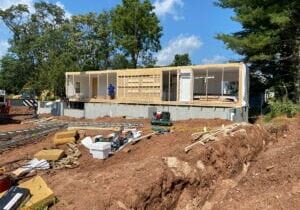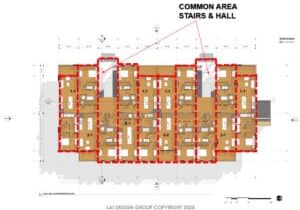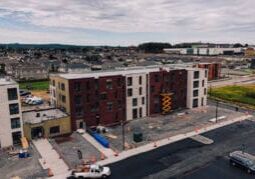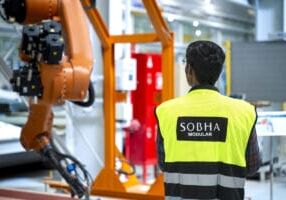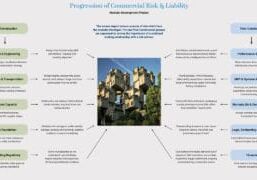A World of Modular Europe levará a Bruxelas percepções e conhecimentos especializados do setor
A construção modular e a construção fora do local de trabalho não são novidade para as partes interessadas da construção na Europa. Ainda assim, com a taxa de inovação e evolução do setor em todo o mundo, a educação contínua, a formação de redes e o compartilhamento de conhecimento são fundamentais. Para isso, o Modular Building Institute (MBI), a maior associação comercial internacional do mundo para o setor de construção modular comercial, está trazendo seu principal evento para o coração da Europa em outubro de 2024.
O World of Modular Europe, a ser realizado em Bruxelas nos dias 1 e 2 de outubro, será um evento como nenhum outro. Com palestrantes, expositores e participantes de toda a Europa e de todo o mundo, o World of Modular Europe será um fórum de classe mundial, que oferecerá percepções importantes, práticas recomendadas e a oportunidade de conhecer líderes e partes interessadas de todos os cantos do setor.
Examinando o estado da construção modular no Reino Unido e na Europa
Palestrantes de todo o Reino Unido e da Europa farão apresentações na World of Modular Europe, incluindo Michael Hough, diretor da MJH Structural Engineers da Irlanda, e Franco Vietti, associado da Green Prefab, sediada na Holanda. Tanto Hough quanto Vietti compartilharão, entre outras coisas, suas percepções sobre o setor com base em seus mais de 20 anos de carreira.
"Recentemente", diz Hough, "o governo do Reino Unido realizou uma pesquisa sobre as barreiras aos métodos modernos de construção (MMC) para ver como o governo pode ajudar a melhorar a produção de moradias. Em termos mais amplos, parece haver um movimento em direção a algum nível de padronização no setor, por meio de plataformas e repetição. Embora exista um lugar para plataformas padronizadas no setor, acredito que essa é apenas uma peça do quebra-cabeça no objetivo de redefinir o setor de construção e melhorar a produtividade de acordo com os desenvolvimentos tecnológicos na sociedade."
Fora do Reino Unido, acrescenta Vietti, "a Europa está aumentando constantemente o valor pré-fabricado de cada projeto de construção, avançando para a adoção não apenas de um sistema específico fora do local, mas de uma combinação de sistemas, dependendo de cada aplicação. Do meu ponto de vista, a hibridização - combinando diferentes métodos de pré-fabricação - é a melhor abordagem para industrializar o setor na Europa, especialmente do ponto de vista do desenvolvedor, a fim de mitigar os riscos de uma ampla cadeia de suprimentos ainda a ser desenvolvida."
"Em última análise, diz Hough, "para avançarmos em direção à aceitação geral da construção modular, precisamos ver a promoção da inovação, da flexibilidade e da adoção de mais soluções modulares para construir cada vez mais edifícios de referência".
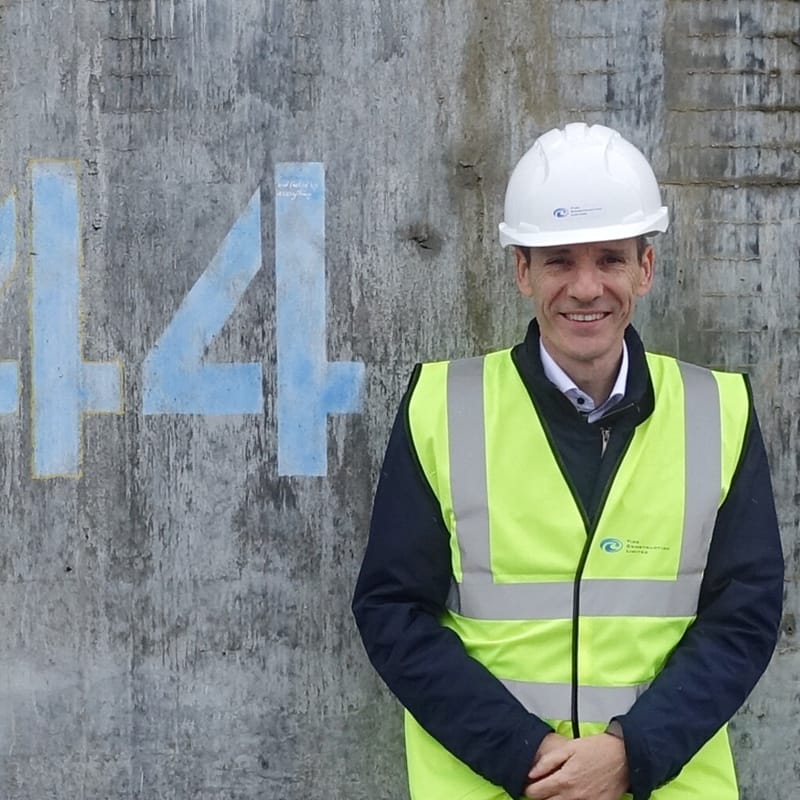
Michael Hough, diretor da MJH Structural Engineers, ao lado do núcleo da 101 George Street em Londres, um projeto modular volumétrico de arranha-céus que ele e sua equipe projetaram. Crédito da foto: Michael Hough.
Explorando as barreiras à adoção do MMC - e as oportunidades que estão por vir
"A Europa é um cenário complexo moldado por estruturas regulatórias rigorosas", diz Vietti, "que podem variar significativamente de um país para outro e até mesmo entre regiões do mesmo país. Em alguns casos, há um forte apoio dos governos, mas isso nem sempre produz resultados eficientes e rápidos. Como em todos os lugares, as iniciativas governamentais para resolver rapidamente problemas estruturais de longo prazo, como escassez de moradias e emergências, costumam ser menos eficazes para impulsionar o setor do que lidar com as ineficiências e a burocracia, permitindo que o setor privado assuma a liderança."
Dito isso, "a construção modular ainda está em sua infância", acrescenta Hough, "sem nenhum sistema claramente definido operando em todos os mercados. Há regiões da Europa onde a construção modular é muito prolífica, como a Suécia, e muitos países onde ela ainda não decolou. A flexibilidade dos códigos na Europa... permite a inovação, mas também exige que o sistema de construção seja comprovadamente capaz de fazer isso".
"A construção volumétrica modular está mostrando um forte desempenho como sistema de entrega para edifícios comerciais, incluindo saúde, educação, acomodação de estudantes e empreendimentos de construção para aluguel", diz Vietti. "Há também um interesse crescente em data centers e outros edifícios de missão crítica. É importante observar que esses mercados também são visados pelas incorporadoras imobiliárias durante as recessões econômicas, e a construção volumétrica modular é a solução perfeita para eles. Dentro desses grupos, as empresas com modelos de negócios diversificados e uma abordagem mais orientada a serviços estão superando as empresas de construção de projetos, especialmente aquelas voltadas para moradias econômicas."
Quanto a Hough, ele diz que "a construção modular de médio porte é provavelmente onde os maiores benefícios estão sendo obtidos na Europa no momento. A divisão entre o local e a fábrica é boa e as construções paralelas têm um grande efeito sobre o programa e o resultado final geral de um projeto. Para alguns fabricantes de modulares, uma vez que a repetição adequada é alcançada verticalmente para permitir a viabilidade de um projeto, é possível acomodar flexibilidade adicional em mudanças horizontais nos layouts dos módulos. Esses efeitos são maiores na construção de prédios altos, e gostaríamos de ver o mercado de construção modular de prédios altos aumentar de tamanho, com outras empresas entrando no mercado construindo prédios modulares cada vez mais altos e fornecendo casas muito necessárias nos centros urbanos."

Franco Vietti, associado da Green Prefab, é engenheiro e empresário com quase 20 anos de experiência no setor de construção modular. Ele trabalhou na Europa, na América Latina e no Oriente Médio e participou de projetos com equipes dos EUA e da África.
Leitura relacionada:
A digitalização da construção fora do local: Tendências e práticas recomendadas em destaque no World of Modular Europe
A digitalização e o software de modelagem de projetos em constante evolução têm ajudado os fabricantes, construtores e projetistas tradicionais há anos. Mais recentemente, as partes interessadas em construção modular e externa com experiência em tecnologia também adotaram essas ferramentas, adicionando seus próprios conhecimentos e dados para criar maneiras mais novas, mais rápidas e mais eficientes de construir. Juntamente com as ferramentas de IA em rápida evolução, esses construtores estão agora ampliando os limites do que é possível com a construção fora do local.

Preparando o palco para o World of Modular Europe
"Na World of Modular Europe", diz Vietti, "vou me concentrar nas oportunidades para que a construção modular entre de fato na economia de serviços. A economia de serviços, que compreende quase 80% das economias dos países desenvolvidos, foi impulsionada pela economia do compartilhamento e pelo comportamento das novas gerações, que enfatizam o "uso em vez da posse" de ativos, favorecendo uma estratégia de ativos leves. Essa tendência apresenta uma oportunidade significativa para o setor modular, já que a construção modular permite que se tenha e ofereça soluções flexíveis de construção para os clientes. Em outras palavras, haverá uma transição de ativos fixos de construção de imóveis para soluções dinâmicas de ativos de construção realocáveis, criando excelentes oportunidades de desenvolvimento.
"Chamamos isso de Construção Modular como Serviço (MBaaS). Isso revolucionará o setor imobiliário comercial ao fazer a transição das ofertas tradicionais de "produto e espaço" para soluções dinâmicas de "sistema e serviço", impulsionadas por automação avançada e IA. Em minha apresentação, explorarei esse novo conceito e como ele pode ser um fator de ruptura para o setor.
"Além disso, examinarei o desempenho de diferentes modelos de negócios, incluindo projeto-construção, arrendamento operacional e MBaaS no setor modular. Discutirei como a diversificação dos modelos de negócios é uma estratégia vencedora para empresas de manufatura que buscam reduzir os riscos e aumentar a lucratividade, as oportunidades de investimento e o retorno sobre o patrimônio para investidores, desenvolvedores e gerentes de ativos."
E em sua apresentação, Hough acompanhará a evolução da construção modular no Reino Unido - com foco em seu trabalho recentemente concluído para o projeto College Road Croydon, de 50 andares - para ver quais outras vantagens estão por vir.
"Se algo foi aprendido nos últimos anos", diz Hough, "é que uma revolução na construção é difícil por vários motivos. Vamos delinear o progresso da construção modular desde o início dos anos 2000 até os níveis atuais de construção e mostrar o que está acontecendo. Apresentaremos projetos e o progresso da construção modular ao longo dos anos.
"Nosso último projeto concluído, College Road Croydon", conclui Hough, "forneceu casas a uma taxa de mais de uma por dia durante todo o programa de construção em um edifício com sete níveis de comodidades. Isso só foi possível graças aos processos paralelos do canteiro de obras e da fábrica, à natureza da ocupação e ao uso de instalações externas para minimizar o programa. Nosso objetivo é que as principais conclusões sejam o potencial e os sucessos do modular à medida que ele se torna mais comum na construção."

O World of Modular Europe, apresentado pelo Modular Building Institute, será realizado em Bruxelas nos dias 1 e 2 de outubro. As inscrições já estão abertas.
Participe do setor em Bruxelas, de 1 a 2 de outubro de 2024
"Participar do World of Modular Europe me entusiasma porque ele oferece uma plataforma única para me conectar com líderes do setor, inovadores e visionários de todo o mundo", diz Vietti. "Eu não teria trabalhado em todo o mundo e estaria colaborando com a Green Prefab se não fosse por um evento da MBI. Esses eventos promovem o compartilhamento de conhecimento, a colaboração e a troca de ideias que impulsionam o setor. Estou particularmente ansioso para aprender com meus colegas, descobrir novas tendências e tecnologias e contribuir para o diálogo contínuo sobre o futuro da construção modular. E talvez voltar para casa com alguns projetos novos."
Veja todos os palestrantes e apresentações do World of Modular Europe e registre-se hoje mesmo.
Sobre o autor: John McMullen, PCM, é o diretor de marketing do Modular Building Institute. Você pode entrar em contato com ele diretamente pelo e-mail mcmullen@modular.org ou pelo LinkedIn.
Mais sobre a Modular Advantage
How Stack Modular Is Using AI to De-Risk Mid- to High-Rise Modular Construction
Artificial intelligence is no longer a future concept in modular construction—it is already reshaping how complex buildings are evaluated, designed, and delivered.
Preparando-se para o mundo modular de 2026
O Modular Building Institute (MBI) está trazendo sua conferência e feira global World of Modular (WOM) de volta a Las Vegas em abril, e com ela vêm algumas das melhores oportunidades do setor para networking, desenvolvimento de negócios e educação.
Novo apartamento modular em arranha-céu em Abu Dhabi aponta para o futuro da construção multifamiliar
Eagle Hills International Properties chose the BROAD Holon Building for a 16-story market rate apartment building in Zayed City, a central business district of Abu Dhabi. The project highlights the potential of the Holon system of volumetric modular construction to accelerate housing delivery.
A MBI anuncia o primeiro programa de aprendizagem do setor em colaboração com o Marshall Advanced Manufacturing Center
A MBI concordou recentemente em fazer parceria com o Marshall Advanced Manufacturing Center (MAMC) para oferecer programas de aprendizagem genuínos aprovados pelo USDOL para o setor.
A AoRa Development pretende construir o primeiro edifício triplo zero líquido de Nova Iorque utilizando métodos modulares
Mais cidades estão fornecendo financiamento para projetos de infraestrutura mais recentes, desde que atendam aos requisitos de sustentabilidade. É assim que o modular pode se encaixar no projeto, graças à sua menor produção de resíduos.
Desenvolvedores e designers: lições aprendidas com o design modular
A construção modular é atraente para muitos desenvolvedores porque o trabalho no local e a construção dos módulos podem ocorrer simultaneamente, encurtando o cronograma e reduzindo custos adicionais.
UTILE: Colocando a construção modular em um caminho rápido
Em Quebec, a UTILE está assumindo a liderança na criação de edifícios modulares acessíveis para ajudar a diminuir a escassez de moradias para estudantes. Durante o processo, a empresa descobriu o que é necessário para tornar a transição para a construção modular um sucesso.
Sobha Modular ensina desenvolvedores a pensar como fabricantes
Com sua fábrica de 250 mil metros quadrados nos Emirados Árabes Unidos, a Sobha Modular está levando seus banheiros modulares de alta qualidade para residências de luxo em Dubai, enquanto desenvolve projetos modulares para os Estados Unidos e a Austrália.
RoadMasters: Por que o planejamento antecipado do transporte é fundamental na construção modular
Na construção modular, o transporte é frequentemente chamado de “elo perdido”. Embora raramente interrompa um projeto por completo, um planejamento inadequado pode causar atrasos dispendiosos, mudanças de rota e excedentes orçamentários.
Navegando pelos riscos no setor imobiliário comercial e na construção modular: insights de um veterano com 44 anos de experiência no setor
Os projetos modulares envolvem fabricação, transporte e montagem no local. Os desenvolvedores devem entender exatamente quais são suas responsabilidades e quais são as responsabilidades dos subcontratados. Os consultores de risco devem pesquisar os contratados, subcontratados e consultores de projeto e construção do desenvolvedor, especialmente o fabricante modular.





